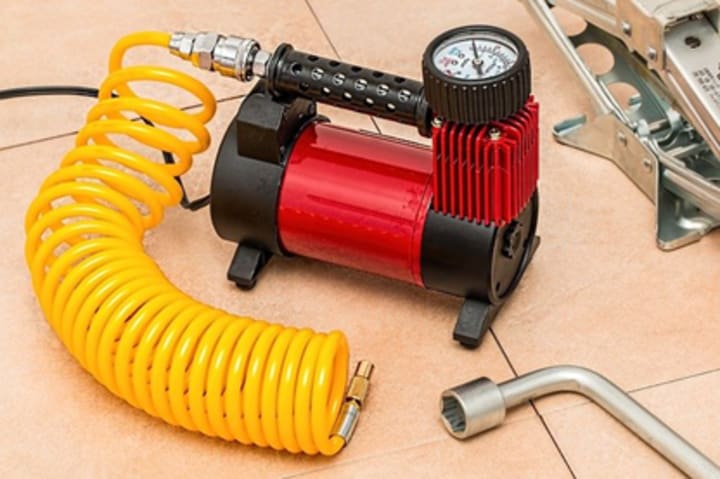
With spring is drifting into summer, the season is upon us for trips to the beach, the lake, or the mountains. Maybe the summer months make you want to take a long road trip, and forget about your worries as you travel across states, or provinces, or even countries. Everyone loves to plan for the summer fun, but few take the time to make sure the fun can continue without the worries caused by common automotive issues. Before you head out on your adventure this summer, make sure you have ticked off these six summer essentials:
Check Your Tires

Maintaining the correct tire pressure is a crucial part of ensuring that your vehicle is operating efficiently. Without the appropriate tire pressure, the way that your car reacts to turning a corner or making a stop can be negatively affected. If there is too much air in the tires on a vehicle, there is less of the tire surface touching the road thanks to the bulbous shape of an over-inflated tire. Additionally, over-filled tires make for a bumpy ride - imagine bouncing a fully inflated basketball versus one filled to less than the maximum amount of air that the material can hold, as with a tire.
Typically, rather than too much air, tires on the road have too little air. This has the potential to be dangerous: with more of the tire surface touching the pavement, friction increases, tires are at risk of overheating. Overheating can cause tire separation, which can easily lead to a blow-out. Depending upon the circumstances, blow-outs while driving could cause a serious accident.
If you live in a place with a lot of snow and annually swap the tires on your vehicle for studded tires, pay special attention to the tire pressure of your summer tires. According to Car Talk, tire pressure decreases by about 1 pound/square inch for every 10-degree drop in outside temperature. Therefore, the tires that were inflated to the correct temperature when you took them off at the end of the last summer season may no longer be inflated to the same pressure! But don’t fail to check tire pressure even if you don’t change your tires with the season -- cold temperatures will result in lower air pressure in your tires even if they are on your vehicle year-round.
Check the Air in your Spare!

While you are checking the tires that are on your vehicle, don’t forget to check the air pressure of your car’s spare tire. Just like the tires on your car, your spare can be affected by a drop in temperature. If your spare is mounted externally on your vehicle, it is at risk for sun damage that could potentially compromise the integrity of the rubber tire. For this type of spare tire storage, it’s best to have a tire cover to protect it from UV damage. Tire covers come in many different colors and patterns, and can be customized to your specifications. Don’t get stranded and spoil your summer, check the air in your spare!
Coolant

The coolant system in your vehicle is meant to prevent overheating of the components that run the engine and other critical systems. The coolant within the coolant system is meant to absorb the heat generated by the engine’s normal functions. Over time, the absorption and dissipation of heat by the liquid in the system can reduce the boiling point of the coolant itself. A reduced boiling point has the potential to cause your vehicle to overheat. Overheating can cause a whole host of other problems for your car, ranging from the need to use your heater during summer months to keep the engine cool to complete engine failure. A seized motor can quickly ruin your summer fun -- make sure your coolant is replaced according to the manufacturer’s recommendations. If you’re unsure about the recommended coolant replacement rate for your vehicle, a general rule of thumb is to replace the coolant in your vehicle every 5 years or 60,000 miles, whichever comes first. If you aren’t sure how long it has been since the coolant in your vehicle was replaced, it may be best to service your coolant system with a licensed automotive repair dealer. If you would like to book a time for this service with Mike’s Auto Repair in Westwood, CA, you can reach the shop at (530) 776-9478, via Facebook, or via their website.
Air Conditioner

Summertime is meant for road trips with the windows down, and the wind blowing through your hair. However, when it gets too hot outside for rolling down the windows to be effective, you can always rely on your air conditioner to cool you down. Or can you? If your a/c isn’t blowing cold, it may need to be “charged”, which is the process of evacuating the existing refrigerant, establishing a vacuum seal to check for leaks, and refilling the air conditioner system with the refrigerant specified by the manufacturer, at their recommended amount. The refrigerant cycles through the system’s compressor, growing colder as the compression increases, before it is turned into vapor and incorporated with outside air before being blown into your car. Mike’s Auto Repair does not yet offer a/c charging services. Should you require this service, make sure you know the 5 Questions to Ask When Choosing a Mechanic.
Cabin Air Filter
Even once your air conditioner is working properly, it still may not be ready for use. If you notice the dreaded moldy or mildew-y smell when using the a/c for the first time after cold weather has retreated, you may need a new cabin air filter. The air filter in the cabin of your vehicle typically needs to be replaced every 10,000 miles, but can sometimes fare longer under certain circumstances. While it is unlikely that a dirty cabin air filter will affect the performance of your vehicle, the presence of mold, mildew, or other allergens can pose a threat to you or your passengers. Some brands offer air filters that trap allergens and/or noxious gases, making the air in your vehicle cleaner, and therefore safer to breathe. If you need your cabin air filter replaced, you can contact Mike’s Auto Repair at (530) 776-9478, on Facebook, or via their website.
Beware of Summer Temps
Many preventable tragedies occur every year when temperatures rise. Children, pets, and anyone else that is otherwise too impaired to care for themselves are highly susceptible to heat exhaustion and even death caused by extreme temperatures. The temperature inside of a vehicle can rise rapidly, quickly surpassing the outdoor temperature and venturing into dangerous territory for living beings. This is particularly true of vehicles with a darker color of paint, but any vehicle can be deadly in warm weather. If it is warm enough that you feel you do not need to wear a jacket or even long sleeves while outdoors, it is already far too “hot” to be left inside a vehicle. Always check the back seat when you exit (and enter)






Comments
There are no comments for this story
Be the first to respond and start the conversation.